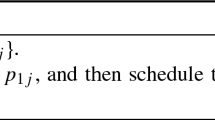Abstract
We introduce and analyze the interval shop scheduling problem, where the objective is to maximize the weighted number of jobs that can be processed in a two-stage flow shop, job shop, or open shop, where each job has a fixed start and end time and requires a given transportation time, i.e., a time lag, for moving from one stage to the other. This problem is a natural extension of the parallel-machine scheduling problem with fixed start and end times, which is relatively well understood. We prove that the two-machine interval flow shop problem is \(\mathcal{NP }\)-hard in the strong sense for general time lags, even in the case of equal processing times and equal weights. The problem is solvable in polynomial time if all time lags are equal. The two-machine interval job shop problem is solvable in \(O(n^3)\) time if the time lags are equal and relatively small. For the two-machine interval open shop problem, this is true as well.




Similar content being viewed by others
References
Arkin, E. M., & Silverberg, E. B. (1987). Scheduling jobs with fixed start and end times. Discrete Applied Mathematics, 18(1), 1–8.
Bar-Yehuda, R., Halldórsson, M. M., Naor, J. S., Shachnai, H., & Shapira, I. (2002). Scheduling split intervals. In Proceedings of the thirteenth annual ACM-SIAM symposium on Discrete algorithms (pp. 732–741). Society for Industrial and, Applied Mathematics.
Bulfin, R. L., & M’Hallah, R. (2003). Minimizing the weighted number of tardy jobs on a two-machine flow shop. Computers and Operations Research, 30(12), 1887–1900.
Cook, S. A. (1971). The complexity of theorem-proving procedures. Proceedings of the third annual ACM symposium on Theory of computing (pp. 151–158).
Douma, A. M., Schutten, M., & Schuur, P. (2009). Waiting profiles: An efficient protocol for enabling distributed planning of container barge rotations along terminals in the port of Rotterdam. Transportation Research Part C: Emerging Technologies, 17(2), 133–148.
Garey, M. R., & Johnson, D. S. (1979). Computers and intractability: A guide to the theory of NP-completeness. New York: WH Freeman & Co.
Hall, N. G., & Sriskandarajah, C. (1996). A survey of machine scheduling problems with blocking and no-wait in process. Operations Research, 44(3), 510–525.
Hariri, A. M. A., & Potts, C. N. (1989). A branch and bound algorithm to minimize the number of late jobs in a permutation flow-shop. European Journal of Operational Research, 38(2), 227.
Kolen, A. W. J., Lenstra, J. K., Papadimitriou, C. H., & Spieksma, F. C. R. (2007). Interval scheduling: A survey. Naval Research Logistics, 54(5), 530–543.
Konings, R. (2007). Opportunities to improve container barge handling in the port of rotterdam from a transport network perspective. Journal of Transport Geography, 15, 443–454.
Kroon, L. G., Salomon, M., & Van Wassenhove, L. N. (1995). Exact and approximation algorithms for the operational fixed interval scheduling problem. European Journal of Operational Research, 82(1), 190–205.
Kroon, L. G., Salomon, M., & Van Wassenhove, L. N. (1997). Exact and approximation algorithms for the tactical fixed interval scheduling problem. Operations Research, 45(4), 624–638.
Lenstra, J. K., Rinnooy Kan, A. H. G., & Brucker, P. (1977). Complexity of machine scheduling problems. Annuals of Discrete Mathematics, 1, 343–362.
Mitten, L. G. (1959). Sequencing n jobs on two machines with arbitrary time lags. Management Science, 5(3), 293–298.
Moore, C., & Robson, J. M. (2001). Hard tiling problems with simple tiles. Discrete and Computational Geometry, 26(4), 573–590.
Potts, C. N., & Whitehead, J. D. (2007). Heuristics for a coupled-operation scheduling problem. Journal of the Operational Research Society, 58(10), 1375–1388.
Rebaine, D., & Strusevich, V. A. (1999). Two-machine open shop scheduling with special transportation times. The Journal of the Operational Research Society, 50(7), 756–764.
Reddi, S. S., & Ramamoorthy, C. V. (1972). On the flow-shop sequencing problem with no wait in process. Operational Research Quarterly, 23(3), 323–331.
Schaefer, T. J. (1978). The complexity of satisfiability problems. Proceedings of the tenth annual ACM symposium on Theory of computing (pp. 216–226).
Simeonov, S., & Simeonovová, J. (1997). Simulation scheduling in food industry application. Czech Journal of Food Science, 20(1), 31–37.
Yu, W., Hoogeveen, H., & Lenstra, J. K. (2004). Minimizing makespan in a two-machine flow shop with delays and unit-time operations is np-hard. Journal of Scheduling, 7(5), 333–348.
Zhang, X., & Van de Velde, S. (2010). Polynomial-time approximation schemes for scheduling problems with time lags. Journal of Scheduling, 13(5), 553–559.
Acknowledgments
The first author of the paper was supported in part by projects of National Natural Science Foundation of China (No. 71171058, No. 70832002, and No. 70971100).
Author information
Authors and Affiliations
Corresponding author
Rights and permissions
About this article
Cite this article
Zhang, X., van de Velde, S. Two-machine interval shop scheduling with time lags. J Sched 18, 359–368 (2015). https://doi.org/10.1007/s10951-013-0336-y
Received:
Accepted:
Published:
Issue Date:
DOI: https://doi.org/10.1007/s10951-013-0336-y




